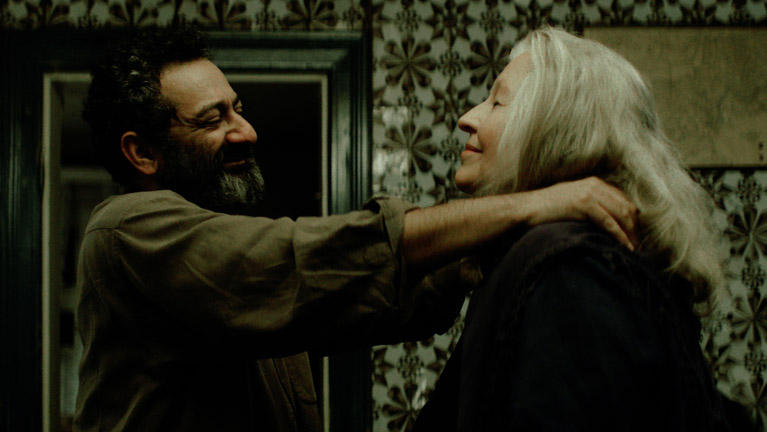A film by Ameer Fakher Eldin
With: Georges Khabbaz, Hanna Schygulla, Ali Suliman, Sibel Kekilli, Tom Wlaschiha, Nidal Al-Askhar, Bassem Yakhour, August Diehl
Munir travels to a remote island to contemplate a drastic action. He is haunted by a cryptic parable passed down to him by his mother. In the silence of his isolated island sanctuary, he encounters the enigmatic Valeska and her rough-hewn but loyal son, Karl. Although few words are spoken, simple acts of kindness begin to overcome their mutual distrust. Munir’s heavy burden is gradually eased and his desire for life reignited
Our rate: **
A rather radical film in both form and content, the film’s aim is to question people’s consciences on a highly topical subject: the way we welcome refugees, the chances we give them to integrate, with a strong focus on how a person who fails to integrate can feel. The director, through a purified, symbolic and mystical representation, attempts to put the equation down to basics: a man and his literary avatar, a disabled, blind, deaf and mute shepherd whose only reason for living is his wife and family, in this case his pretty wife, who provides the comfort that keeps him on his feet. The concept is simple, effective, dignified and allows us to perceive Munir’s distress, inviting us to scrutinize his evolution. It is reminiscent of recent cinematic endeavors (Rasoulof’s A Man of Integrity in its first third) and, more generally, follows in the footsteps of Eastern cinema, which questions the present through ancient writings and traditions (some of Mohsen Makhmalbaf’s films, for example), or Khalil Gibran’s (The Prophet) quest to simplify reflection. This naturalistic approach has the merit of a certain radicalism, and of allegorically representing a situation experienced today by those who have emigrated and are rejected by some of their hosts, who are also blind and deaf to their suffering, imposing their model on them without opening the doors that would allow them to move forward and build themselves in dignity. What precipitates Munir’s departure from his shack next to the railroad line is, in addition to poor housing, the absence of a horizon, but also – and this is something he doesn’t put into words – homesickness. His self-imposed pilgrimage to a submerged wasteland (a symbol?) will enable him to see things more clearly, as it will for the viewer, who may nonetheless regret that it has come to this, and wonder whether the message has been properly received by those to whom it is addressed? For, in a way, to show that an expatriate would only dream of returning to his or her homeland (Yunan deliberately keeps quiet about Munir’s past, whether he himself immigrated or was born in Germany), is to reveal the failure of integration and even of the help that Western countries pride themselves on providing, to abandon all hope, to renounce not a promise of a better future, It’s giving credence to the prevailing discourse, which emphasizes Europe’s inability to welcome all the world’s misery (although this may well be true), the better to disseminate a xenophobic, nationalist discourse, and remove all guilt from the racist impulse. We don’t doubt the sincerity of the message, or even its function as a call for help or a wake-up call, but we do have serious doubts about the film’s ability to offend those who believe that the source of their malaise comes from others, from outsiders who come to take advantage of their country’s generosity, and to explain away, like a magic wand, all the societal and economic failings of the governments of powerful countries. To put it another way, the film suffers from its timing, and loses its universality due to the fact that the subject is so topical. This rather beautiful and universal subject, this pamphlet that poses the question of solidarity and puts it into perspective through a skilful formal process, clashes with our present, with what is at stake in Europe, and just about everywhere else in the world, even though it manages to hold on to the thread it has set itself, even though it offers some striking and evocative scenes, The meeting between Munir and Valeska, for example, can be read in a number of different ways, with Valeska showing Munir openness (and humanity) only after he has lost his temper, then apologized, reminding him of his duties, before he conditionally obtains his rights. Valeska, who turns out to be the one who cares for Munir, among the handful of withdrawn natives bound together by their own tradition, is a small hopeful sign of positive change in all this gloom. Perhaps this is precisely how we should interpret the enigmatic maxim that Valeska whispers in Munir’s ear in the midst of an anxiety attack (You have too much air. If you had less air, you’d be less short of it. Unless this is a call for degrowth.










Be First to Comment